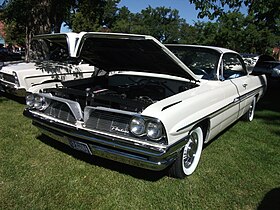Pontiac Ventura
| Pontiac Ventura | |
|---|---|
| Overview | |
| Manufacturer | Pontiac (General Motors) |
| Production | 1960–1977 |
| Body and chassis | |
| Class |
Full-size (1960–1970) Compact (1971––1977) |
| Layout | FR layout |
| First generation | |
|---|---|
 |
|
| Overview | |
| Production | 1960–1961 1966–1969 |
| Body and chassis | |
| Body style | 2-door hardtop coupe 4-door sedan 2-door convertible |
| Platform | B-body |
| Related |
Chevrolet Impala Chevrolet Caprice Chevrolet Bel Air Pontiac Catalina Pontiac Bonneville Pontiac Parisienne Oldsmobile 88 Buick LeSabre |
| Dimensions | |
| Wheelbase | 122.0 in (3,099 mm) |
| Chronology | |
| Successor | Pontiac Catalina Brougham |
| Second generation | |
|---|---|
 |
|
| Overview | |
| Also called | Pontiac Ventura II |
| Model years | 1971–1977 |
| Assembly | Van Nuys, California |
| Body and chassis | |
| Body style | 2-door coupe 4-door sedan |
| Platform | X-body |
| Related |
Chevrolet Nova Pontiac Phoenix Oldsmobile Omega Buick Apollo |
| Powertrain | |
| Engine | 250 cu in (4.1 L) I6 305 cu in (5.0 L) V8 307 cu in (5.0 L) V8 350 cu in (5.7 L) V8 |
| Transmission | 2-speed automatic 3-speed manual 4-speed manual 3-speed automatic |
| Dimensions | |
| Wheelbase | 2,814 mm (110.8 in) |
| Length | 4,940 mm (194.5 in) |
| Width | 1,839 mm (72.4 in) |
| Height | 1,334 mm (52.5 in) |
| Chronology | |
| Successor | Pontiac Phoenix |
The Pontiac Ventura is an automobile that was produced by Pontiac. The name was derived from Ventura, California. Until 1992, General Motors had an assembly plant that manufactured X-body models in the district of Van Nuys, Los Angeles at Van Nuys Assembly.
The Ventura was first introduced for 1960 as a new higher priced model on Pontiac's standard full-size 122-inch B-body wheelbase, shared with the Pontiac Catalina. It was available as a four-door Vista sedan and two-door hardtop. It had unique exterior identification, deluxe wheel covers, a sport steering wheel, and distinctive tri-tone seats done in "Morrokide" (Pontiac's leather-like vinyl upholstery).
The Ventura continued for 1961 as a series, but for 1962 through 1965, it was a custom trim option on the Catalina. The Ventura series returned for 1966, continuing through 1969. It went back as an custom trim option on the Catalina for 1970. It was replaced by the Catalina Brougham series for 1971.
In 1971, Pontiac moved the name to their new X-body Nova clone, the Ventura II.
Ventura II production ran from 1971 to 1977. The "II" suffix was dropped after 1972, and the Phoenix name replaced Ventura in 1978. Engine offerings for the abbreviated 1971 model year included a 250 cu in. six cylinder or 307 cu in., only the 307 was available for the Sprint option in '71. For 1972, a Pontiac-built 350 cu in. V8 with two-barrel carburetor was added to the option list and became the base V8 for 1973 and 1974. Transmission offerings consisted of a standard column-shift three-speed manual with options including a four-speed manual, two-speed automatic (with six-cylinder) or three-speed Turbo Hydra-Matic automatic (with V8s). The 1973 six-cylinder Ventura was the last Pontiac model to offer the two-speed automatic, a badge-engineered Chevrolet Powerglide, which was dropped completely from all GM cars and trucks after this model year in favor of the Turbo Hydra-Matic.
...
Wikipedia
